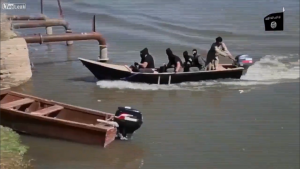On April 15, 2016 the Combined Joint Task Force Inherent Resolve released a press statement detailing their continued strikes against the Islamic State of Iraq and Levant group. What was interesting about the release was the large number of strikes against “boats”. The press release calls attention to the destruction of 18 ISIL boats near Hit, Iraq as well as the destruction of 33 ISIL boats near Qayyarah, Iraq.
Hit, is an ISIL controlled town along the Euphrates river in Anbar Province. Qayyarah is an ISIL controlled town along the western bank of the Tigris river in Nineveh province. The large collection of boats in each of these small towns draws the obvious question “what are the doing there?”
One hypotheses is that as it’s self-declared state is pushed back, the rivers are being used to move supplies either to, or away from the frontline. The strike on Hit was against what CJTF-IR called a “command and control node”. Following from this logic the 18 boats could have been any combination of supply and other boats near the command post. The US government has in the past sold Vietnam-era river patrol boats to Iraqi Security Forces, but nothing in the open source literature indicates these boats were deployed, much less operable along the Euprhates. Or indicate that if they were deployed along the Euphrates, ISIL used the boats in military operations.
The strike against the 33 ISIL boats near Qayyarah fits better with the explanation of supplies being moved away from the frontline. US Department of Commerce documents show that ISIL had an oil field, refinery and gas power plant in Qayyarah at one time. It makes sense that despite the threat of coalition airstrikes, ISIL would still attempt to smuggle oil out of the area. The pressure to keep the war machine running will be increased as IS loses more territory, and by extension tax revenue. Whether this strike was dumb luck, or evidence of a larger shift to extract value from natural resources is unclear. The issue of waterways in IS controlled territory it understudied. It is therefore difficult to walk away with any useful insights or recommendations for now.
anotherwarblog.wordpress.com



